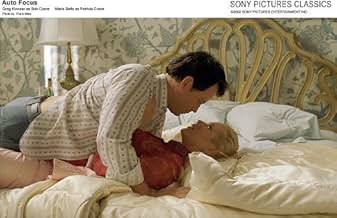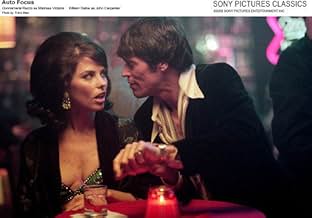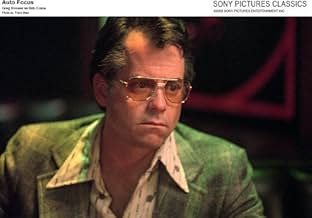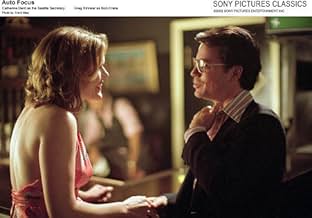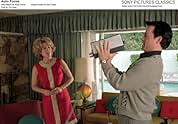The life of TV star Bob Crane and his strange friendship with electronics expert John Henry Carpenter.The life of TV star Bob Crane and his strange friendship with electronics expert John Henry Carpenter.The life of TV star Bob Crane and his strange friendship with electronics expert John Henry Carpenter.
- Awards
- 6 nominations total
Michael E. Rodgers
- Richard Dawson
- (as Michael Rodgers)
DonnaMarie Recco
- Melissa
- (as Donnamarie Recco)
- …
- Director
- Writers
- All cast & crew
- Production, box office & more at IMDbPro
Featured reviews
Wow, is Greg Kinnear nothing short of amazing in this film or what! An incredible performance as Bob Crane, seriously virtuoso. When, towards the end, he visits his agent and is all messed up, and starts saying "sex is normal. I'm normal" - Kinnear reaches a pinnacle in his young film acting career. I have always felt that actors ascend to the next level of craft and stardom when they breakthrough with a biographical role; see - Denzel Washington in Malcom X, Ben Kingsley in Ghandi, Robert Downey Jr in Chaplin, Peter O'Toole in Lawrence of Arabia. And now Greg Kinnear has made that leap with Auto Focus, a well-crafted and seductive film by Paul Schrader, Hollywood's last bastion of non-sugar coated filmmakers. Basically the story of Hollywood's most intriguing unsolved murder, Auto Focus also pulls back the curtain on "good guy" Bob Crane's lecherous and painfully discombobulated private and secret life. What is also amazing about this film is how is records the birth of video and the VCR. Bob Crane turns out to be one of the pioneer "users" of this technology. When we see or hear video, video cameras, or VCRs, we probably automatically think of home movies, recording episodes of Star Trek, or the Star Wars prequels' lack of cinematic quality. When Bob Crane heard about video cameras and VCRs, he automatically thought of sex. Though the film makes no mention of it, it is quite prophetic in showing us how the technology of video created hard-core pornography and turned it into a billion dollar industry. If you think about it, nothing has profited more from video than porno, and nothing ever relied so dearly on video like porno. Bob Crane instinctively felt this, though he never was a pornographer, so to speak; he knew that sex and video can go hand in hand. Unfortunately, this was also his downfall. Like most Paul Schrader writ or directed films, by the end you get that queasy feeling, the feeling you get at the end of Goodfellas, the feeling of sadness that this great ride is over and the feeling of emptiness and loss that all that greatness came crashing down. Bob Crane's descent into moral madness can be sickening, especially when juxtaposed with Hogan's Heroes. I almost felt the desire to shower, to cleanse myself after viewing this film. I love movies that produce reactions from me, movies that linger for days. This is one of them.
A cautionary tale of the dangers of sexual addiction, `Auto Focus' shows what can happen when a person attempts to lead a double life in this case, a straight-laced family man by day and a pornography-obsessed playboy by night. In `Auto Focus,' the family man/pornographer turns out to be none other than the well-known actor Bob Crane, the star of TV's `Hogan's Heroes,' who was found murdered in a Scottsdale, Arizona hotel room in 1978 under mysterious and sensational circumstances that included the uncovering of tapes Crane had made of his own sexual experiences. The general public was shocked to discover that a man they had invited into their living rooms every week for six years had been living such an unsavory parallel existence though those who knew him well were apparently far less shocked by the revelation. Drawing on Robert Graysmith's book `The Murder of Bob Crane' for its inspiration and viewpoint, the film, written by Michael Gerbosi and directed by Paul Schrader, chronicles the rise and fall of this handsome actor, from his days as a successful LA disc jockey and his meteoric rise to fame as star of a hit comedy series, to his growing obsession with promiscuity and pornography, which led to the disintegration of both his personal and professional life - and, ultimately, to his death, most likely at the hands of his buddy-in-sleaze, videographer John Carpenter (though he was never convicted of the murder).
`Auto Focus' certainly does not shy away from revealing many of the salacious details of this true-life story. Schrader deals head-on with the disturbing nature of a mind so all consumed with the subject of sex that all other aspects of life become obliterated and distorted. What's fascinating about Crane at least in the way he is depicted in this film is that he seems to have had some sort of self-destructive death wish, for not only does he risk his career by sleeping with countless women, but he insists on leaving behind the evidence by videotaping many of his encounters, and then flaunting his `accomplishments' to others in the Hollywood community. In a way, such a cavalier attitude only underlines the sickness at the core of Crane's soul which in a perverse, paradoxical way, actually makes Crane a more sympathetic figure than he otherwise might be. An enormous amount of credit for this also goes to Greg Kinnear who does a superb job of not only replicating Crane's style of acting but of showing us the tortured man Crane became in his later years. He was truly a man driven to madness by the demons within him, and we can all identify in some sense with that condition (our demons may not be sexual in nature, but they probably eat away at us just as ravenously as they did Crane). Kinnear gets outstanding support from Willem Dafoe as Carpenter, the Svengali-like figure who lures Crane into his world of photographed sex, and Ron Leibman, as Crane's well-meaning, caring agent who can do little but stand by helplessly as his client throws his career and his life away to feed this devouring passion.
The filmmakers have done an amazing job capturing the sights and sounds of the era in which the film is set. Especially impressive are the scenes recreating `Hogan's Heroes,' with Kurt Fuller, in particular, a standout as Werner Klemperer (Colonel Klink). It's also fascinating to see the evolution of videotape technology as portrayed in the film. How many of us knew that such equipment existed for home consumption as early as the mid-60's?
There's a real sadness to the final stretches of the film, made all the more poignant by having the dirge-like musical score run uninterrupted under the action. The effect is that we really get a sense of the total desolation of Crane's life at that point as he has lost his family, his career, and his self-respect to the master he chose early on to serve. The loss of his life seems almost de rigueur given all that has gone before. `Auto Focus' is not always an easy film to watch, but for its unflinching look at an often-unappetizing subject, it deserves to be seen.
`Auto Focus' certainly does not shy away from revealing many of the salacious details of this true-life story. Schrader deals head-on with the disturbing nature of a mind so all consumed with the subject of sex that all other aspects of life become obliterated and distorted. What's fascinating about Crane at least in the way he is depicted in this film is that he seems to have had some sort of self-destructive death wish, for not only does he risk his career by sleeping with countless women, but he insists on leaving behind the evidence by videotaping many of his encounters, and then flaunting his `accomplishments' to others in the Hollywood community. In a way, such a cavalier attitude only underlines the sickness at the core of Crane's soul which in a perverse, paradoxical way, actually makes Crane a more sympathetic figure than he otherwise might be. An enormous amount of credit for this also goes to Greg Kinnear who does a superb job of not only replicating Crane's style of acting but of showing us the tortured man Crane became in his later years. He was truly a man driven to madness by the demons within him, and we can all identify in some sense with that condition (our demons may not be sexual in nature, but they probably eat away at us just as ravenously as they did Crane). Kinnear gets outstanding support from Willem Dafoe as Carpenter, the Svengali-like figure who lures Crane into his world of photographed sex, and Ron Leibman, as Crane's well-meaning, caring agent who can do little but stand by helplessly as his client throws his career and his life away to feed this devouring passion.
The filmmakers have done an amazing job capturing the sights and sounds of the era in which the film is set. Especially impressive are the scenes recreating `Hogan's Heroes,' with Kurt Fuller, in particular, a standout as Werner Klemperer (Colonel Klink). It's also fascinating to see the evolution of videotape technology as portrayed in the film. How many of us knew that such equipment existed for home consumption as early as the mid-60's?
There's a real sadness to the final stretches of the film, made all the more poignant by having the dirge-like musical score run uninterrupted under the action. The effect is that we really get a sense of the total desolation of Crane's life at that point as he has lost his family, his career, and his self-respect to the master he chose early on to serve. The loss of his life seems almost de rigueur given all that has gone before. `Auto Focus' is not always an easy film to watch, but for its unflinching look at an often-unappetizing subject, it deserves to be seen.
Not having had a chance to see the movie first-run, I bought the DVD and was impressed with it. The movie itself was, to borrow a phrase from another review on this site "brilliantly disturbing." Those of us who remember when Bob Crane was murdered at an apartment in Scottsdale, AZ while doing dinner theater gig; that was weird in of itself. After all who would want to kill good old Colonel Hogan? I remember watching Crane on the show, and also on talk or game shows. He seemed so together, self-assured and quick-witted. So it was even more of a shock to find out about his double-life, which this movie covers so well although it is perhaps a bit misleading in spots.
Greg Kinnear does very good as Crane, especially in the latter scenes of the film. I think the part of Bob Crane would be somewhat difficult to play. Crane's legendary status is caught up not in his career itself, but his life other "on camera" life. A life that ended with his bludgeoning death (by blows from a camera tripod.) in June, 1978, just two weeks before what would have been his 50th birthday. Wilhem Dafoe is even better as the creepy John "Carpie" Carpenter, a video salesman who Crane meets on the set of Hogan's Heroes. Virtually all the supporting cast is also quite good. Particularly good are Kurt Fuller as Werner Klemperer/Col. Klink and Rob Leibman, who plays Crane's agent who watches helplessly as Crane's career and personal life veer out of control and plummet.
Carpenter, an electronics expert, at the time worked for Sony, selling the new and expensive technology of videotape players to mostly celebrities or others wealthy enough to afford them. The movie takes the viewer through the mid-late 1960's as Crane and Carpenter, both sex addicts, videotape their seemingly every night exploits with women they pick up from night clubs. This is no problem for Crane who was handsome and famous. Carpenter was portrayed as a hanger-on, along for the ride, and taking Crane's "seconds." Crane, married with children is at first able to hide his double-life from his family, although his wife is suspicious of his roving eye.. As a sidebar, there are some interesting tidbits in the movie about the development of videotape in the 60's into the 70's. After the cancellation of Hogan's Heroes in 1971 and his expensive divorce (his wife found photographic evidence of his escapades), Crane's sex addition seemingly worsens. He remarries, this time to an actress who played Col Klink's secretary in the Hogan's Heroes who tells him his dalliances are okay with her. They have a son soon after they are married and even she grows weary of his being away so much with Carpenter.
The mood of the film is in the beginning almost light-hearted, almost campy at times. . As the film continues and as Crane's personal life steadily implodes, professional life goes on the decline, a sense of darkness and desperation engulf the film. This is reinforced superbly by the hues on screen and the background music. The symbiotic relationship between Crane and Carpenter are portrayed so convincingly. Crane needed Carpenter for his video expertise and Carpenter needed Crane for the access to women. It is stunning how cavalier Crane was about picking up women and taping his sex acts, with or without their consent.
Crane is portrayed as a nearly broke totally washed-up B or C grade celebrity at the time of his murder. This was not necessarily the case. Crane in fact had made a lot of guest appearances on television series and game shows in the early and mid-70's. He had been signed to star in an ABC Movie of the Week shortly before his murder. Crane also owned a portion of Hogan's Heroes, and had received a royalty check in 1977 of over $95,000. Doing dinner theater was more a choice he had made, and he was making amounts off dinner theater that rivaled his royalty checks. Not a fortune, but a very decent living, especially for that time. To be sure he was strained by having to support one but two families, plus his addiction. He was not the big star he was, but not in oblivion, either. Only so much can be covered in the film's 90 or so minute running time, but the notion that his professional life was in smithereens was a bit misleading. Yet, many in Hollywood knew about his exploits and it no doubt cost him in professional opportunities. There is debate on both sides whether or not Crane at the time of his murder was attempting to change his life.
Near the end it is clear Crane had grown tired of "Carpie" and had basically told him the friendship as they knew it was coming to an end. This was just a day or so before his murder. Carpenter was arrested and tried years later for the murder but acquitted. He died in 1998, and the case officially remains unsolved.
Paul Schrader (Taxi Driver) directs so well this lurid and unflinching story. The DVD has lots of extras, including 3 different commentaries. The first by Kinnear and Dafoe, is good. Schrader's commentary is best as it offers a lot of insight into how they were able to make a relatively low-budget picture ($7 million I recall) look like they easily spent twice that amount. There is a third commentary was by the screenplay writers that I found dull. The deleted scenes are worth watching. For those interested in the Crane murder and the "whodunit" aspect there is a 45 minute feature entitled "Murder in Scottsdale" loaded with interviews and archival footage. The movie is based on Robert Graysmith's The Murder of Bob Crane, which I found to be interesting reading.
Greg Kinnear does very good as Crane, especially in the latter scenes of the film. I think the part of Bob Crane would be somewhat difficult to play. Crane's legendary status is caught up not in his career itself, but his life other "on camera" life. A life that ended with his bludgeoning death (by blows from a camera tripod.) in June, 1978, just two weeks before what would have been his 50th birthday. Wilhem Dafoe is even better as the creepy John "Carpie" Carpenter, a video salesman who Crane meets on the set of Hogan's Heroes. Virtually all the supporting cast is also quite good. Particularly good are Kurt Fuller as Werner Klemperer/Col. Klink and Rob Leibman, who plays Crane's agent who watches helplessly as Crane's career and personal life veer out of control and plummet.
Carpenter, an electronics expert, at the time worked for Sony, selling the new and expensive technology of videotape players to mostly celebrities or others wealthy enough to afford them. The movie takes the viewer through the mid-late 1960's as Crane and Carpenter, both sex addicts, videotape their seemingly every night exploits with women they pick up from night clubs. This is no problem for Crane who was handsome and famous. Carpenter was portrayed as a hanger-on, along for the ride, and taking Crane's "seconds." Crane, married with children is at first able to hide his double-life from his family, although his wife is suspicious of his roving eye.. As a sidebar, there are some interesting tidbits in the movie about the development of videotape in the 60's into the 70's. After the cancellation of Hogan's Heroes in 1971 and his expensive divorce (his wife found photographic evidence of his escapades), Crane's sex addition seemingly worsens. He remarries, this time to an actress who played Col Klink's secretary in the Hogan's Heroes who tells him his dalliances are okay with her. They have a son soon after they are married and even she grows weary of his being away so much with Carpenter.
The mood of the film is in the beginning almost light-hearted, almost campy at times. . As the film continues and as Crane's personal life steadily implodes, professional life goes on the decline, a sense of darkness and desperation engulf the film. This is reinforced superbly by the hues on screen and the background music. The symbiotic relationship between Crane and Carpenter are portrayed so convincingly. Crane needed Carpenter for his video expertise and Carpenter needed Crane for the access to women. It is stunning how cavalier Crane was about picking up women and taping his sex acts, with or without their consent.
Crane is portrayed as a nearly broke totally washed-up B or C grade celebrity at the time of his murder. This was not necessarily the case. Crane in fact had made a lot of guest appearances on television series and game shows in the early and mid-70's. He had been signed to star in an ABC Movie of the Week shortly before his murder. Crane also owned a portion of Hogan's Heroes, and had received a royalty check in 1977 of over $95,000. Doing dinner theater was more a choice he had made, and he was making amounts off dinner theater that rivaled his royalty checks. Not a fortune, but a very decent living, especially for that time. To be sure he was strained by having to support one but two families, plus his addiction. He was not the big star he was, but not in oblivion, either. Only so much can be covered in the film's 90 or so minute running time, but the notion that his professional life was in smithereens was a bit misleading. Yet, many in Hollywood knew about his exploits and it no doubt cost him in professional opportunities. There is debate on both sides whether or not Crane at the time of his murder was attempting to change his life.
Near the end it is clear Crane had grown tired of "Carpie" and had basically told him the friendship as they knew it was coming to an end. This was just a day or so before his murder. Carpenter was arrested and tried years later for the murder but acquitted. He died in 1998, and the case officially remains unsolved.
Paul Schrader (Taxi Driver) directs so well this lurid and unflinching story. The DVD has lots of extras, including 3 different commentaries. The first by Kinnear and Dafoe, is good. Schrader's commentary is best as it offers a lot of insight into how they were able to make a relatively low-budget picture ($7 million I recall) look like they easily spent twice that amount. There is a third commentary was by the screenplay writers that I found dull. The deleted scenes are worth watching. For those interested in the Crane murder and the "whodunit" aspect there is a 45 minute feature entitled "Murder in Scottsdale" loaded with interviews and archival footage. The movie is based on Robert Graysmith's The Murder of Bob Crane, which I found to be interesting reading.
Let's face it: Bob Crane was a lightweight actor, whose one-note portrayal of Col. Hogan in the unlikeliest sitcom hit of the 60s made him a household name. Personally, I never understood the appeal of either "Hogan's Heroes" or its star.
Greg Kinnear taps into Bob Crane, though, from the first frame.
The viewer learns that the pre-Hogan Crane was an affable, lovable kind of guy whose LA radio show had a big following. His agent sees him as a combination of Jack Lemmon and Jack Benny, a potential star of fluffy sex comedies with a benign sort of sex appeal and a knack for snappy one-liners All of that was a vast overestimation of Crane's talents.
Crane reveled in the fame that "Hogan" brought him, but he seems never to have taken a long view of his career. When the show ended he was left rudderless and idle, having slowly cut the ties that bound him to ordinary life -- his work, a stable home life, and his religious faith.
While he coasted, Crane took advantage of the easy, cynical charm he conveyed on screen to lure women. By the dozen. I think he probably enjoyed being the least likely man in Hollywood to skulk strip clubs looking for prey, and to devote thousands of yards of videotape to his exploits with them. But his naivete is telling: Crane allows himself to be led into a netherworld by John Carpenter, (Willem Dafoe), who teaches him that putting sex on film is more fun than having it. And there is a brief scene where Crane meets a dominatrix and reveals himself as not quite savvy enough to play this game to win.
Addictions tend to claim those who are on the way up or the way down. Even before Peg Entwistle famously jumped off the Hollywoodland sign in 1922, there have been scores of aspirants to fame or has-beens whose compulsions have killed them, leaving their work on screen the least compelling,least-remembered part of their lives.
Greg Kinnear taps into Bob Crane, though, from the first frame.
The viewer learns that the pre-Hogan Crane was an affable, lovable kind of guy whose LA radio show had a big following. His agent sees him as a combination of Jack Lemmon and Jack Benny, a potential star of fluffy sex comedies with a benign sort of sex appeal and a knack for snappy one-liners All of that was a vast overestimation of Crane's talents.
Crane reveled in the fame that "Hogan" brought him, but he seems never to have taken a long view of his career. When the show ended he was left rudderless and idle, having slowly cut the ties that bound him to ordinary life -- his work, a stable home life, and his religious faith.
While he coasted, Crane took advantage of the easy, cynical charm he conveyed on screen to lure women. By the dozen. I think he probably enjoyed being the least likely man in Hollywood to skulk strip clubs looking for prey, and to devote thousands of yards of videotape to his exploits with them. But his naivete is telling: Crane allows himself to be led into a netherworld by John Carpenter, (Willem Dafoe), who teaches him that putting sex on film is more fun than having it. And there is a brief scene where Crane meets a dominatrix and reveals himself as not quite savvy enough to play this game to win.
Addictions tend to claim those who are on the way up or the way down. Even before Peg Entwistle famously jumped off the Hollywoodland sign in 1922, there have been scores of aspirants to fame or has-beens whose compulsions have killed them, leaving their work on screen the least compelling,least-remembered part of their lives.
This is a movie about a man's downfall; in this case, sex. I saw this right after 'Requiem for a Dream'(I guess I was in an addictive mood). This is a sad movie, but not on par with 'Requiem'. I never knew the sordid details about 'Col. Hogan', but this movie laid it out for me. The acting is very good. As other's viewers have noticed, the cinematography and music matches the decline of Crane's life. I was very depressed near the end. There is an obvious implication of his friend Carpenter in his murder, and outside of a court of law, many people would believe it. It's like a weak Oliver Stone/JFK, but still believable. Kind of like a required homework assignment that they may never get credit for, yet execute at 100 percent and show their merit. It wasn't a box office movie, but I believe it's worth watching, and it is exemplarary work by the actors. Maybe it needed more supporting character development, maybe longer screen shots.
Did you know
- TriviaThe leather jacket that Greg Kinnear wears while playing Bob Crane in the Papa Schultz (1965) scenes of this movie is the one that the real Crane actually wore during the filming of that TV series. Crane's son Robert David Crane loaned the jacket to Kinnear for this movie. Prior to the original "Hogan's Heroes" show, Frank Sinatra wore this exact same jacket in L'express du colonel von Ryan (1965).
- GoofsThere is a glimpse of the famous Capitol Records building painted silver. At the time of the film, it was actually painted black to resemble a stack of records.
- Quotes
Bob Crane: I think it's perfect for me. I mean, this character Hogan, he's quick on his toes, he's hip, he's a con artist. I don't wanna jinx it, but I think it's what I've been working toward my whole career!
Anne Crane: Really? You've been working towards a Holocaust comedy?
Bob Crane: Ann!
Anne Crane: What, Bob?
Bob Crane: Please, not in front of the children! They look up to me!
Anne Crane: They're small. They look up to everyone.
- Alternate versionsThe following deleted scenes appear on the DVD:
- Victoria finds Bob's body.
- Hogan's Heroes Montage
- Bob unloads drums and some dirty magazines fall out.
- Anne and Bob talking by the pool.
- Anne in the darkroom.
- ConnectionsFeatured in Auto Focus: Featurette (2002)
- SoundtracksSnap!
Written by Paul Schrader and Angelo Badalamenti
Performed by David Johansen (as Buster Poindexter)
Produced by Brian Koonin
- How long is Auto Focus?Powered by Alexa
Details
Box office
- Budget
- $7,000,000 (estimated)
- Gross US & Canada
- $2,063,196
- Opening weekend US & Canada
- $123,761
- Oct 20, 2002
- Gross worldwide
- $2,704,951
- Runtime
- 1h 45m(105 min)
- Color
- Sound mix
- Aspect ratio
- 1.85 : 1
Contribute to this page
Suggest an edit or add missing content







